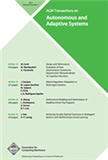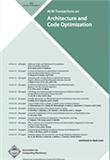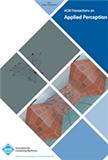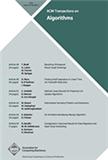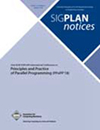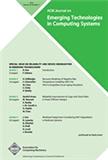Future Generation Computer Systems-The International Journal of eScience
SCIE
- 雜志名稱:未來一代計算機系統——國際科學雜志
- 簡稱:FUTURE GENER COMP SY
- 期刊ISSN:0167-739X
- 大類研究方向:工程技術
- 影響因子:5.768
- 數據庫類型:SCIE
- 是否OA:No
- 出版地:NETHERLANDS
- 年文章數:300
- 小類研究方向:工程技術-計算機:理論方法
- 審稿速度:偏慢,4-8周
- 平均錄用比例:容易
官方網站:http://www.journals.elsevier.com/future-generation-computer-systems/
投稿網址:http://ees.elsevier.com/fgcs/default.asp?acw=8
Future Generation Computer Systems-The International Journal of eScience
英文簡介Computing infrastructures and systems are rapidly developing and so are novel ways to map, control and execute scientific applications which become more and more complex and collaborative.Computational and storage capabilities, databases, sensors, and people need true collaborative tools. Over the last years there has been a real explosion of new theory and technological progress supporting a better understanding of these wide-area, fully distributed sensing and computing systems. Big Data in all its guises require novel methods and infrastructures to register, analyze and distill meaning.FGCS aims to lead the way in advances in distributed systems, collaborative environments, high performance and high performance computing, Big Data on such infrastructures as grids, clouds and the Internet of Things (IoT).The Aims and Scope of FGCS cover new developments in:[1] Applications and application support:Novel applications for novel e-infrastructuresComplex workflow applicationsBig Data registration, processing and analysesProblem solving environments and virtual laboratoriesSemantic and knowledge based systemsCollaborative infrastructures and virtual organizationsMethods for high performance and high throughput computingUrgent computingScientific, industrial, social and educational implicationsEducation[2] Methods and tools:Tools for infrastructure development and monitoringDistributed dynamic resource management and schedulingInformation managementProtocols and emerging standardsMethods and tools for internet computingSecurity aspects[3] Theory:Process specification;Program and algorithm designTheoretical aspects of large scale communication and computationScaling and performance theoryProtocols and their verification
Future Generation Computer Systems-The International Journal of eScience
中文簡介計算基礎設施和系統正在迅速發展,地圖、控制和執行科學應用的新方法也在迅速發展,這變得越來越復雜和協作。計算和存儲能力、數據庫、傳感器以及人們都需要真正的協作工具。在過去的幾年里,新的理論和技術進步發生了真正的爆炸,支持人們更好地理解這些廣域、全分布式的傳感和計算系統。所有形式的大數據都需要新的方法和基礎設施來注冊、分析和提取意義。FGCS旨在引領分布式系統、協作環境、高性能和高性能計算、網格、云和物聯網等基礎設施上的大數據的發展。煙氣脫硫的目標和范圍包括以下方面的新發展:[1]應用程序和應用程序支持:新型電子基礎設施的新應用復雜的工作流應用程序大數據登記、處理和分析問題解決環境和虛擬實驗室基于語義和知識的系統協作基礎架構和虛擬組織高性能和高吞吐量計算方法緊急計算科學、工業、社會和教育意義教育類[2]方法和工具:基礎設施開發和監控工具分布式動態資源管理與調度信息管理協議和新興標準因特網計算方法和工具安全方面〔3〕理論:工藝規范;程序與算法設計大規模通信與計算的理論問題尺度與性能理論協議及其驗證
精選同類領域期刊,熱門推薦輕松get~
-
- ACM Transactions on Autonomous and Adaptive Systems
- 期刊ISSN:1556-4665
- 大類研究方向:工程技術
- 影響因子:
- 數據庫類型:SCIE
- 咨詢投稿
-
- ACM Transactions on Architecture and Code Optimization
- 期刊ISSN:1544-3566
- 大類研究方向:工程技術
- 影響因子:1.444
- 數據庫類型:SCIE
- 咨詢投稿
-
- ACM Transactions on Applied Perception
- 期刊ISSN:1544-3558
- 大類研究方向:工程技術
- 影響因子:
- 數據庫類型:SCIE
- 咨詢投稿
-
- ACM Transactions on Algorithms
- 期刊ISSN:1549-6325
- 大類研究方向:工程技術
- 影響因子:
- 數據庫類型:SCIE
- 咨詢投稿
-
- ACM SIGPLAN NOTICES
- 期刊ISSN:0362-1340
- 大類研究方向:工程技術
- 影響因子:
- 數據庫類型:無
- 咨詢投稿
-
- ACM Journal on Emerging Technologies in Computing Systems
- 期刊ISSN:1550-4832
- 大類研究方向:工程技術
- 影響因子:2.013
- 數據庫類型:SCIE
- 咨詢投稿
精選常見問題,答疑解惑輕松get~
- 三篇ssci論文怎么同時投出去
- 中文核心和sci哪個影響力更大
- 中科院一區和JCR一區期刊占比區別
- 發ssci如何快速找合適的期刊
- 資源保護方面論文投sci指導
- 外貿行業論文發ssci周期長嗎
- 國外的sci投到錄用一般多久
- ssci期刊國內認可度
- 核能應用論文翻譯英文發sci容易的方法
- 人口老齡化研究論文符合ssci領域嗎
- sci開源和不開源分別是什么意思?有什么影響?
- ssci發表是高水平學術論文嗎
- 生態修復主題英文論文會收錄哪些數據庫
- 哲學專業論文發英文期刊
- 中科院sci四個區的劃分
- ssci期刊和sci期刊的區別
- ESCI和SCIE要分清
- ssci送審論文多久出結果
- ssci論文二作有用嗎
- 水土保持類英文期刊好選嗎
- ssci期刊論文一定會檢索嗎
 投稿咨詢
投稿咨詢

